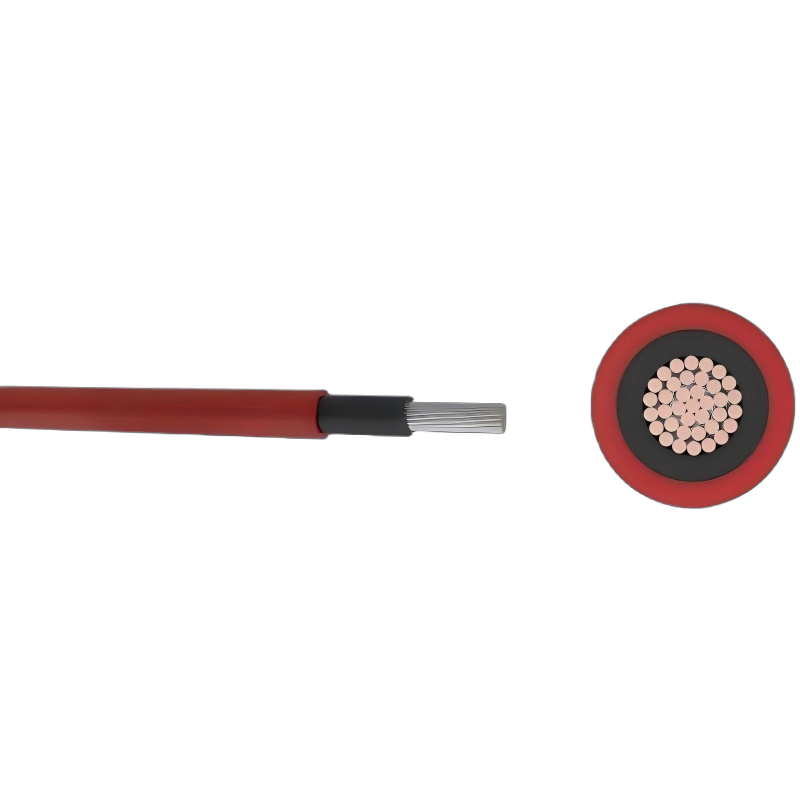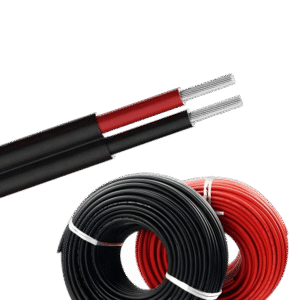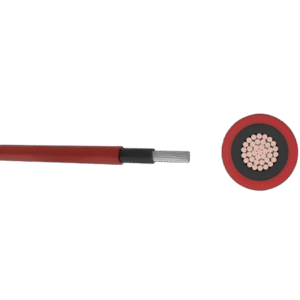PV1-F (Tinned Cu/XLPE/LSZH)
Solar cables are a critical component in any photovoltaic (PV) power system, designed to connect solar panels and other major components efficiently and safely. Our solar cables are engineered for long-term performance in demanding environments. A key feature is their robust resistance to UV radiation, extreme temperatures, and harsh weather conditions, ensuring the integrity of your renewable energy projects.
Application
This PV1-F cable is perfect for all kinds of photovoltaic power supply systems. You can use it in many settings, both indoors and outdoors. It performs well in industrial and agricultural areas. This cable works with equipment that needs protective insulation (Class II). It is also safe for areas where explosion hazards might be present. You can install these cables in various ways: fixed, freely hanging, or even movable. They are suitable for cable trays, conduits, and for mounting on or within walls.
Description
The Gongniu Cable PV1-F cable is built for performance and safety. It features a flexible, tinned copper conductor. This conductor is Class 5 (K) as per IEC 60228 standards, ensuring efficient power transfer. The insulation is made from a halogen-free, cross-linked LS0H-XL compound. This material is black and offers excellent protection. The outer sheath also uses a halogen-free, cross-linked LS0H-XL compound. This sheath is typically black or red, providing a durable and low-smoke, zero-halogen covering.
Specification
Our PV1-F Photovoltaic Cable meets the strict requirements of 2 PfG 1169/08. Key technical details include:
- Rated Voltage: 1.0 kV DC and 0.6/1.0 kV AC.
- Maximum Operating Voltage: Up to 1.8 kV DC and 1.2 kV AC.
- Test Voltage: 6.5 kV AC for 5 minutes and 15 kV DC for 5 minutes.
- Bending Radius: For fixed installations, the minimum bending radius is about 4 times the cable’s outer diameter.
- Temperature Range: It operates reliably from -40°C to +90°C. The maximum conductor temperature is 120°C
Technical Parameter
PV1-F 2 PfG 1169/08 Table1
| No. of Cores and Nominal Cross Section (No.× mm²) | Max. Diameter of Copper Wires (mm) | Min. Insulation Thickness (mm) | Min. Sheath Thickness (mm) | Approx. Weight (kg/km) | Max. DC Resistance of Conductor at 20℃ (Ω/km) |
|---|---|---|---|---|---|
| 1×1.5 | 0.26 | 0.5 | 0.5 | 32 | 13.7 |
| 1×2.5 | 0.26 | 0.5 | 0.5 | 43 | 8.21 |
| 1×4 | 0.31 | 0.5 | 0.5 | 56 | 5.09 |
| 1×6 | 0.31 | 0.5 | 0.5 | 79 | 3.39 |
| 1×10 | 0.41 | 0.5 | 0.5 | 128 | 1.95 |
| 1×16 | 0.41 | 0.5 | 0.5 | 186 | 1.24 |
| 1×25 | 0.41 | 0.5 | 0.5 | 284 | 0.795 |
| 1×35 | 0.41 | 0.5 | 0.5 | 384 | 0.565 |
PV1-F 2 PfG 1169/08 Table2
| Current rating conversion factors for different ambient temperatures | ||||||
|---|---|---|---|---|---|---|
| Ambient Temperature,℃ | Up to 60 | 70 | 80 | 90 | 100 | 110 |
| Conversion Factor | 1.00 | 0.91 | 0.82 | 0.71 | 0.58 | 0.41 |
PV1-F 2 PfG 1169/08 Table3
| Nominal cross section (mm²) | Current carrying capacity | ||
|---|---|---|---|
| Single cable, in air (A) | Single cable on a surface (A) | Two loaded cables touching, on a surface (A) | |
| 1.5 | 30 | 29 | 24 |
| 2.5 | 41 | 39 | 33 |
| 4 | 55 | 52 | 44 |
| 6 | 70 | 67 | 57 |
| 10 | 98 | 93 | 79 |
| 16 | 132 | 125 | 107 |
| 25 | 176 | 167 | 142 |
| 35 | 218 | 207 | 176 |
Ambient temperature: 60℃,Maximum conductor temperature: 120℃.
YOU MAY LIKE
Related products
-
TUV Solar Cable
Solar Cable By TUV: High-Quality Solar Power Cables
-
TUV Solar Cable
H1Z2Z2-K (Tinned Cu/XLPO/XLPO)
-
TUV Solar Cable
Type PV (Tinned Cu/XLPE/LSZH)



